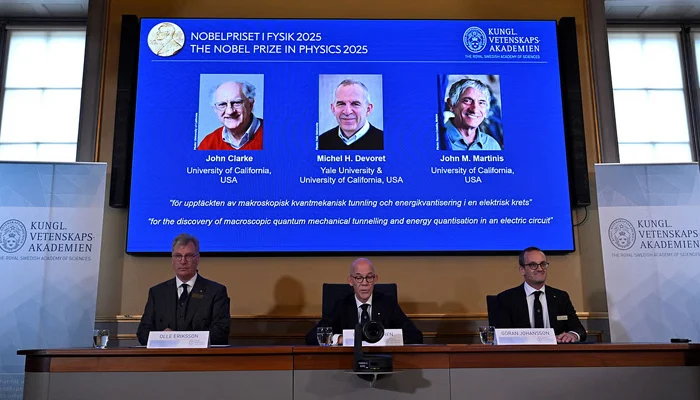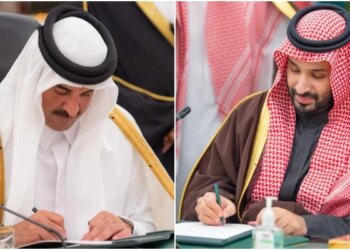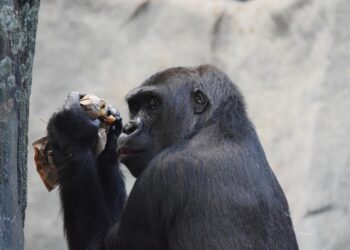Select Language:
John Clarke, Michel H. Devoret, and John M. Martinis were announced as this year’s Nobel Prize winners in Physics by the Royal Swedish Academy of Sciences during a press conference in Stockholm, Sweden, on October 7, 2025. — AFP
The Nobel Committee awarded the prestigious physics prize to British scientist John Clarke, French physicist Michel Devoret, and American researcher John Martinis for their groundbreaking work in quantum physics. The award recognizes their discovery of macroscopic quantum tunneling and energy quantization in electric circuits. Quantum mechanics explains how phenomena behave on incredibly tiny scales; for instance, while a normal ball bounces off a wall, a quantum particle can pass directly through a barrier—a phenomenon known as “tunneling.”
Their experiments from the 1980s demonstrated that quantum tunneling can be observed at a larger, macroscopic level—using superconductors and involving multiple particles. These experiments proved that the counterintuitive properties of quantum physics can be manifested in systems large enough to be held in the palm of a hand, according to the Royal Swedish Academy of Sciences. Their work has opened doors to developing advanced quantum technologies like quantum cryptography, quantum computing, and highly sensitive quantum sensors.
Olle Eriksson, chair of the Nobel Physics Committee, expressed his enthusiasm, saying, “It is wonderful to celebrate how quantum mechanics, which has been understood for over a century, continues to surprise us and remains highly relevant. Quantum mechanics underpins all digital technology.”
Clarke, 83, a professor at the University of California, Berkeley, shared his surprise upon learning of the award, stating, “To put it mildly, it was the surprise of my life.” He confessed that he never imagined their research would lead to a Nobel Prize and noted that their focus was purely on exploring the physics of their experiments, not on potential applications.
Devoret, 72, is a professor at the University of California, Santa Barbara, and also holds emeritus status at Yale University. Martinis, born in 1958, is a professor at UC Santa Barbara as well.
This announcement marks the second Nobel of the 2025 season, following the medicine prize awarded Monday to a US-Japanese team for their work on the human immune system. That team included Mary Brunkow and Fred Ramsdell from the United States and Shimon Sakaguchi from Japan, recognized for identifying immune system “security guards.” Last year’s physics laureates included Geoffrey Hinton from Britain-Canada and John Hopfield from the US, both pioneers in artificial intelligence who cautioned about the societal risks of their discoveries.
Upcoming awards this week include the chemistry prize on Wednesday, the literature award on Thursday, and the highly sought-after Nobel Peace Prize on Friday. The Nobel season concludes with the economics prize on October 14.
Recipients of Nobel medals and awards will be presented with diplomas, gold medals, and a $1.2 million cash prize, divided if multiple winners are honored in a single discipline. The prize ceremony takes place in Stockholm on December 10, coinciding with the anniversary of scientist Alfred Nobel’s death in 1896, the founder of these awards.





